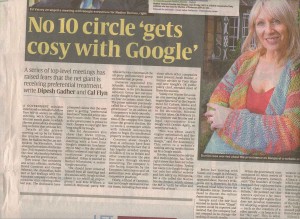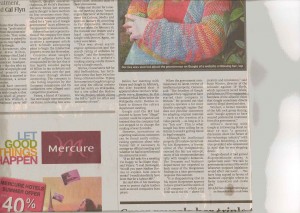Moving away from phone hacking and plagiaristic journalists for a minute, there’s an interesting article tucked away on page 4 of today’s Sunday Times. Unfortunately, the Sunday Times’ policy on hiding away their online content means I can’t link to it, so I’ve made a couple of manky scans of it instead.
No 10 circle ‘gets cosy’ with Google
The essence of the article is to report claims by some copyright owners that Google is getting “preferential treatment” by the government. That’s not necessarily surprising, but the article is worded in a way which seems intended to support the anti-Google argument. It notes that the Chancellor, George Osborne, has met representatives of Google five times since the general election last year, and Ed Vaizey, the Business Secretary, has met Google six times. After spending about four columns wittering on about the meetings, without ever really describing what issues there are about them, it then changes tack to mention the Hargreaves review of copyright. To save you squinting at the scan, I’ll retype that section for you:
When the government commissioned its latest review of intellectual property, Cameron said “The founders of Google have said they could never have started their company in Britain'” He pointed out that America operates a far more flexible copyright regime that does not penalise innovators for adapting original material – such as the creation of a video parody – as long as it is for “fair use”. This is what Google has been calling for in Britain to avoid it getting mired in legal wrangles.
Although the intellectual property (IP) review carried out by Ian Hargreaves, a former editor of The Independent, rejected the fair use concept, many of his recommendations tally with Google’s demands. The Treasury and business department are expected to back many of the Hargreaves findings in a joint government response this summer.
Now, I’d call that good news. Of course Google isn’t perfect, but the Hargreaves review (which I blogged about earlier this year) does look like a very good set of proposals and it’s hardly surprising that a lot of them are fairly close to what Google (and other online innovators) want to see. The Sunday Times article, though, contains no approving comments at all. Instead, we have two quotes from people opposed to the changes. Susie Winter, of the Alliance Against IP Theft, and Pete Wishart, formerly of Runrig but now an SNP MP, are both quoted as claiming that the government is giving Google preferential treatment, while Winter’s comments also include the assertion that the Hargreaves review is biased against UK content creators.
I don’t particularly blame Winters and Wishart for stating their views. They’ve set out their stall in defence of the “big business” model of media distribution, and both have earned their living from it. But the absence of any quotes from the opposite perspective does seem a little strange. The Sunday Times has no legal obligation to be unbiased, but I wouldn’t necessarily expect them to be so blatantly biased either.
In any case, there’s a lot about these claims of preferential treatment that have a bit of a hollow ring. So George Osborne has met Google five times since the last election. How many times, I wonder, has David Cameron met Rebekah Brooks? News International is, of course, a company which has made its money as part of the old-fashioned content distribution system, and its only major investment into the new online world, the acquisition of MySpace, went spectacularly down the pan. And, as I said at the start of this article, the Sunday Times is fundamentally opposed to the idea of allowing Google (or anyone else who isn’t willing to pay for it) to have access to any of its online content.
So the Sunday Times’ bias here has to be taken with a pinch of salt, since it’s clearly in the interests of their proprietor to maintain the status quo. So, too, do the comments of Winter and Wishart, since that’s where they earn their money – Winter directly, and Wishart as part of his ongoing right to royalties from the record labels that distribute Runrig. But, if they’re getting rattled by the possibility of the Hargreaves review proposals being adopted, then that can only be good news for the rest of us.
Nuts
Incidentally, and almost as a sidenote, the article also contains a classic example of why the offline media industry just doesn’t get it. Referring back to the Alliance Against IP Theft (which is about as accurately named as if it were called the Alliance Against IP Murder), the article points out that
Members of the Alliance claim that Google sometimes directs users to illegal download sites.
Now, that’s true, but only in the same sense that a satnav will sometimes direct users to Middlesborough – it will if that’s where you want to go. But the implication of the complaint is that Google is somehow deliberately diverting people away from legal download sites and sending them unwillingly to illegal ones. That, of course, is just plain nuts (as opposed to Google nuts), but it’s surprising how widespread this kind of error seems to be. In fact, there was one such report in The Times not so long ago, in which the author also seemed to be taking the side of the clueless. And, of course, if you try to search Google (or Bing) for any of the keywords in the Sunday Times article I’m talking about, guess what – you won’t end up at the Sunday Times’ website. Here, for example, is a link to a Google search for “Google appears to have secured preferential treatment”, the exact wording of the quote from Pete Wishart. The Sunday Times is notable by its absence from the results.



